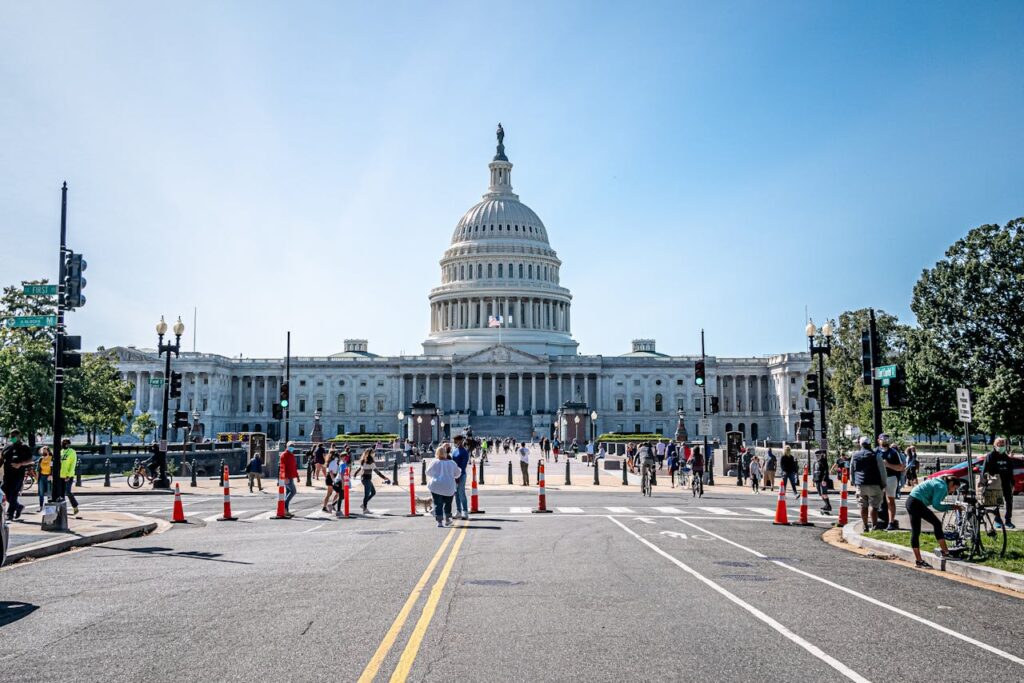Good morning from Washington where sunny skies and warm weather on the way signals positive vibes that a deal might be in the works for a temporary patch to fund the government. Reports over the weekend however made those of us following these developments believe a shutdown might still be in the works. If nothing is accomplished this week, a temporary shutdown would occur at midnight this Friday, followed by a full-scale shutdown on March 8. Procrastination is often a hallmark of Congress, much like my first-grade son getting dressed for school in the morning. Nothing like a good hurry up and wait heading into upcoming negotiations… Welcome to the Week Ahead!
The Administration
President Biden took the lead this weekend to bring House and Senate leaders together for discussions at the White House. The “big four” (Schumer, McConnell, Johnson, and Jeffries) will be meeting on Tuesday to discuss how to fund the government and delay a shutdown. With the State of the Union also on the horizon, it is important the President work with Congress to find a resolution. Concerns from agencies mount, as Congressional Republicans are looking to cut funding across the board like the National Institutes of Health which is looking to face a $3.8 billion cut to their $48 billion in funding the agency received last year. Meanwhile, House Republicans plan to continue to push for the impeachment of Homeland Security Secretary Mayorkas this week. It is very likely the impeachment proceeding goes nowhere in the Senate as many vulnerable Democrats and conservative senators signaled, as they do not have an appetite to move forward.
The Senate
Senator Schumer sent a Dear Colleague letter blasting House Republicans for not coming to the budget negotiations in earnest. The letter outlines concerns and ramifications as to what will occur if a deal is not struck this week. Concerns include cuts to programs which could impact vulnerable families through the Supplemental Nutrition Program for Women, Infant, and Children (WIC), potential shutdowns of veteran offices, as well as a potential FAA freeze which would negatively impact the hiring of air traffic controllers and cause delays in air travel across the country.
Health Care
Right now all eyes remain on whether or not the big four can come to an agreement on funding the government and what impact a partial or full shutdown will cause on a variety of health care programs.
The House
After a week-plus legislative break for the Presidents’ Day district work period, the House returns on Wednesday to consider a slew of bills under suspension of the rules. In a sign of the times, and the struggles facing both chambers, another short-term extension of reauthorization through May 10 was added to the legislative schedule, and arguably, the need for another short-term FAA extension points to the larger challenges facing House Speaker Mike Johnson (R-LA) and House Republicans in coming to an agreement both internally and ultimately with Senate negotiators on legislation to fund the government and on numerous policy provisions that have been connected to the government funding conversations as well.
With the first tranche of funding for four appropriations bills expiring this Friday, March 1, a partial government shutdown is now looking to be a very real possibility. Heading into the weekend, congressional leaders looked poised to release a bipartisan agreement on the first tranche of appropriations bills on Sunday, but ultimately, House and Senate leaders could not come to an agreement as Speaker Johnson continued to face pressures within his own conference—particularly from the Freedom Caucus—over the inclusion of certain policy riders. While this has impact on government appropriations, these struggles also raise questions about what agreement can be reached on various health measures, including several health programs that are set to expire on March 8. Among the expiring provisions are payments under the Medicaid Disproportionate Share Hospitals (DSH) Program, the Work Geographic Practice Cost Index (GPCI) Floor, and funding for Teaching Health Center Graduate Medical Education (THC GME), Community Health Centers (CHCs), and the National Health Service Corps (NHSC). In addition, the House Republican Doctors Caucus and physician organizations are continuing their push for relief from the 3.37% cut in Medicare payments that took effect on January 1.
Health Care
With the House not returning for legislative business until Wednesday afternoon, it will be a light week for health policy. Of note, though, the Energy & Commerce will continue to be active on the health care front with the Committee’s Health Subcommittee holding a legislative hearing on Thursday, February 29, titled “Legislative Proposals to Support Patients with Rare Diseases.” The hearing, which is set to set to coincide with the nationally recognized “Rare Disease Day 2024,” will examine 18 bills related to rare diseases and the challenges facing rare disease patients.
As always, we will be in touch with developments. Create a great week!

